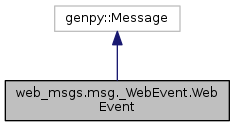Definition at line 8 of file _WebEvent.py.
| def web_msgs.msg._WebEvent.WebEvent.__init__ |
( |
|
self, |
|
|
|
args, |
|
|
|
kwds |
|
) |
| |
Constructor. Any message fields that are implicitly/explicitly
set to None will be assigned a default value. The recommend
use is keyword arguments as this is more robust to future message
changes. You cannot mix in-order arguments and keyword arguments.
The available fields are:
source,type,data
:param args: complete set of field values, in .msg order
:param kwds: use keyword arguments corresponding to message field names
to set specific fields.
Definition at line 19 of file _WebEvent.py.
| def web_msgs.msg._WebEvent.WebEvent._get_types |
( |
|
self | ) |
|
|
private |
| def web_msgs.msg._WebEvent.WebEvent.deserialize |
( |
|
self, |
|
|
|
str |
|
) |
| |
unpack serialized message in str into this message instance
:param str: byte array of serialized message, ``str``
Definition at line 80 of file _WebEvent.py.
| def web_msgs.msg._WebEvent.WebEvent.deserialize_numpy |
( |
|
self, |
|
|
|
str, |
|
|
|
numpy |
|
) |
| |
unpack serialized message in str into this message instance using numpy for array types
:param str: byte array of serialized message, ``str``
:param numpy: numpy python module
Definition at line 147 of file _WebEvent.py.
| def web_msgs.msg._WebEvent.WebEvent.serialize |
( |
|
self, |
|
|
|
buff |
|
) |
| |
serialize message into buffer
:param buff: buffer, ``StringIO``
Definition at line 53 of file _WebEvent.py.
| def web_msgs.msg._WebEvent.WebEvent.serialize_numpy |
( |
|
self, |
|
|
|
buff, |
|
|
|
numpy |
|
) |
| |
serialize message with numpy array types into buffer
:param buff: buffer, ``StringIO``
:param numpy: numpy python module
Definition at line 119 of file _WebEvent.py.
| list web_msgs.msg._WebEvent.WebEvent.__slots__ = ['source','type','data'] |
|
staticprivate |
| string web_msgs.msg._WebEvent.WebEvent._full_text |
|
staticprivate |
Initial value: 1 =
"""string source # who or what triggered the event 2 string type # type of event (e.g. login, logout) 3 string data # any data about the event Definition at line 12 of file _WebEvent.py.
| bool web_msgs.msg._WebEvent.WebEvent._has_header = False |
|
staticprivate |
| string web_msgs.msg._WebEvent.WebEvent._md5sum = "4f05e2e1608bf7d788fa5e654f805aeb" |
|
staticprivate |
| list web_msgs.msg._WebEvent.WebEvent._slot_types = ['string','string','string'] |
|
staticprivate |
| string web_msgs.msg._WebEvent.WebEvent._type = "web_msgs/WebEvent" |
|
staticprivate |
| web_msgs.msg._WebEvent.WebEvent.data |
| web_msgs.msg._WebEvent.WebEvent.source |
| web_msgs.msg._WebEvent.WebEvent.type |
The documentation for this class was generated from the following file:
